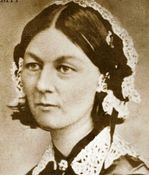 Florence Nightingale founded modern nursing, reformed the British public health system, improved military medicine and dedicated her life to caring for the sick. She earned her reputation by caring for wounded British soldiers during the Crimean War with Britain, France, Turkey and Sardinia against Russia. In 1854, she arrived in Turkey with a group of 38 volunteer nurses that she had trained. They found abysmal conditions in the army hospital that was overrun with rats and was overcrowded with soldiers who did not have adequate food, water or bandages. The troops were dying by the thousands, suffering from infected wounds, cholera, dysentery, typhoid and brucellosis, a fever-causing bacterial infection. At that time, more soldiers died from these diseases than from battlefield wounds. Nightingale and her nurses worked night and day to improve hygiene and provide better conditons for the suffering soldiers. The death rate fell dramatically, and she became a national heroine.
Florence Nightingale founded modern nursing, reformed the British public health system, improved military medicine and dedicated her life to caring for the sick. She earned her reputation by caring for wounded British soldiers during the Crimean War with Britain, France, Turkey and Sardinia against Russia. In 1854, she arrived in Turkey with a group of 38 volunteer nurses that she had trained. They found abysmal conditions in the army hospital that was overrun with rats and was overcrowded with soldiers who did not have adequate food, water or bandages. The troops were dying by the thousands, suffering from infected wounds, cholera, dysentery, typhoid and brucellosis, a fever-causing bacterial infection. At that time, more soldiers died from these diseases than from battlefield wounds. Nightingale and her nurses worked night and day to improve hygiene and provide better conditons for the suffering soldiers. The death rate fell dramatically, and she became a national heroine.
Privileged Beginnings
Nightingale was born in 1820 into a wealthy, upper class British family and was educated by her father. She rebelled against her mother and sister who expected her to become a wife and mother, the roles that were considered appropriate for women of her social status. She educated herself in the science of nursing and rejected offers of marriage so she could pursue what she felt was her calling.
The Nurse Becomes the Patient
Not only was Nightingale hard working, compassionate and caring, she was also a brilliant and prolific writer who wrote extensively about the pain, suffering and neglect of the very soldiers who were fighting to protect their countrymen. She did all this in spite of a recurring lifelong illness that caused her to hear voices and in her later years, she spent months confined to a bed and unable to work. Before returning to England from the Crimea, she became ill with a high fever and fatigue. She spent periods when she was irrational and was unable to communicate intelligently with other people. Her doctors diagnosed her as having brucellosis, a tuberculosis-like disease that is transmitted through milk from infected cows. But brucellosis does not account for her severe mood swings, or the fact that she could alternatively be so productive and so incapacitated. She continued to work up to 20 hours a day, even while complaining of spinal pain, insomnia, anorexia, nervousness and depression.
For much of the last 40 years of her life, she confined herself to her room with a wide range of ailments. Despite being isolated in her room, she established the first modern nursing school and wrote more than 200 reports and books, including the first nursing textbook. She was also an accomplished mathematician. She was among the first to apply statistics to the study of public health, and is credited with inventing the statistical pie chart.
Extreme Mood Swings
She experienced periods of extreme productivity, followed by depression that left her with long periods of not being able to work. She often described herself as a failure and worthless, even though she received the Royal Red Cross from Queen Victoria and many other honors during her long life. She asked in a letter, "Why, oh my God, can I not be satisfied with the life that satisfies so many people and be told that the conversation of all of these clever men ought to be enough for me? Why am I starving, desperate and diseased on it?"
She suffered from what is now called bipolar disorder (formerly manic-depression), a condition that in the manic phase allowed her to be unbelievably productive and in the depressive phase so disabled her that she couldn't get out of bed. People suffering from bipolar disorder have alternating moods of:
• abnormal highs in which they think that they can do anything, accomplish prodigious work, and sometimes make great discoveries
• deep depression in which they feel so terrible that they often can't even get out of bed or communicate with anyone.
Sometimes the swings in mood occur very rapidly, but more commonly, they are gradual. The changes from mania to depression and back can cause some very successful business people to make terrible financial decisions, brilliant scientists to defend ridiculous theses, and famous entertainers to have difficulty getting on stage. Bipolar disorder is often a chronic recurring condition that can, rarely, turn into psychosis with hallucinations and delusions. Today it may be treated with medications such as Lithium, valproate (Depakote), lamotrigine (Lamictal), topiramate (Topamax) or carbamazepine (Tegretol).
She Was Not Alone
Other notable people who may have suffered from bipolar disorder include:
Artists: Michelangelo, Vincent van Gogh
Authors: Hans Christian Andersen, Charles Dickens, Emily Dickinson, William Faulkner, F.Scott Fitzgerald, Walt Whitman, Tennessee Williams
Business Leaders: Howard Hughes, J. P. Morgan
Scientists: Sigmund Freud, Sir Isaac Newton
Musicians: Irving Berlin, Frederic Chopin, Stephen Foster, Cole Porter
World Leaders: Alexander the Great, Napoleon Bonaparte, Abraham Lincoln, Winston Churchill

